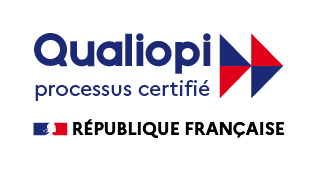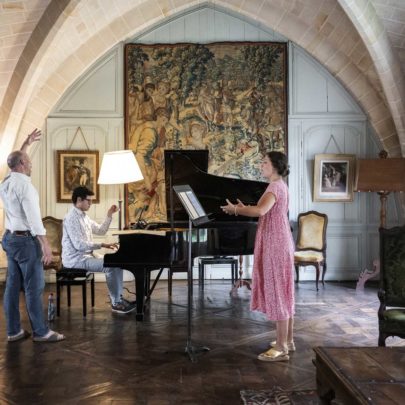Scenic unit
Period
July 13 to August1, 2026
Presentation
Moshe Leiser and Patrice Caurier, in parallel with a career as stage directors that includes over 120 opera productions, are more than ever keen to pass on their expertise.
Since 2018, the Royaumont Foundation has had the honor of welcoming them for training sessions and, after having worked on Mozart’s Don Giovanni, Massenet’s Werther, excerpts from Rossini operas, Debussy’s Pelléas et Mélisande – extended by a production followed by some twenty performances on tour and summer 2025 Poulenc’s Dialogues des Carmélites .
In 2026, the directors of Claudio Monteverdi’s Coronation of Poppea will be working on a highly demanding musical and theatrical project. The aim of this training program is to reveal the great singers of tomorrow by giving them the keys to understanding their role. A harpsichordist and vocal coach will assist them in their work.
This intensive course is designed for 8 or 9 singers of all tessituras: soprano, mezzo, alto, counter-tenor, tenor-baritone and bass.
The selected prizewinners, coached by Moshe Leiser and Patrice Caurier, will work on the scenic and musical interpretation of all the roles in Poppea ‘s Coronation, which features some twenty characters.
Teachers
Patrice Caurier was born in Paris and Moshe Leiser in Antwerp. They decided to work together in 1982, staging Benjamin Britten’s opera A Midsummer Night’s Dream at the Opéra de Lyon. Since then, they have staged over one hundred and twenty productions in theaters around the world, to international acclaim and recognition. Their productions have been staged at the Grand Théâtre de Genève (The Ring), the Opéra de Lausanne (Shostakovich’s The Nose), Covent Garden (The Barber of Seville), the Théâtre du Châtelet (Eugène Onéguine), the Liceo in Barcelona (Madame Butterfly), the Metropolitan Opera in New York (Hamlet), the Zurich Opera (L’italienne à Alger), Vienna Opera (The Magic Flute), Salzburg Festival (Norma), Baden-Baden Festival (The Queen of Spades), Pesaro Festival (L’equivoco stavagante), as well as in Monaco, Cardiff, Charleston, Nantes, Antwerp and, recently, Venice (Mefistofele, Abbiati prize for best staging), Valencia (L’heure espagnole and Gianni Schicchi).
NN harpsichordist vocal coach
Terms and conditions
Audience
9 singers + 1 assistant director
- Soprano > Poppea
- Tenor or countertenor > Nerone
- Mezzo-soprano > Ottavia, la fortuna
- Bass > Seneca
- Baritone or countertenor > Ottone
- Soprano > Drusilla, Virtu
- Countertenor > Nutrice, Amore
- Tenor > Lucano, Valetto…,
The other roles: Pallade, Venere, Soldati, Famigliari, Damigella, Mercurio, Littore will be assigned to the prizewinners as the course progresses.
Prerequisites and conditions of access to training
- To be a professional singer at the end of higher education.
- A good level of Italian will be appreciated.
- Participants formally undertake to complete the entire training course.
Duration
- July 13 to August1, 2026 (arrivals on July 12 afternoon, departures on August 2 morning)
- 3 weeks – 20 days (including 2 days off) or 126 hours
- Campus spotlight on August1, 2026 at 6:00 p.m. Public presentation without remuneration
Rates
Application
Pre-selection on the basis of applications by the teaching team:
- 1 or more video files related to the chosen course (please note that WeTransfer links will not be uploaded)
- Cover letter
- Short biography (600 characters including spaces)
- CV
- Photo (max: 100MB)
To be presented for audition :
- 1 recitative from an opera in Italian
- 1 excerpt from the opera Coronation of Poppea
Calendar
Closing date for applications: November 2, 2025
- Stage 1: Pre-selection based on application
- Answer: from November 3, 2025
- Stage 2: Shortlisted candidates will be invited to an audition to be held in Paris in early December.
- Final answer: from early January 2026
All Royaumont Foundation training programs have a minimum lead time of 11 working days.
Example: if the Royaumont Foundation validates the registration request on June 14, it can offer the beneficiary a course starting on June 29.
Fiche programme
version n°1 dated 05/2025
Validity of version n°1: 1 year renewable
Course description/content of the training
| Day 1 | Afternoon: welcome to beneficiaries and supervisors. Presentation of the Campus and the Royaumont Foundation | Presence of beneficiaries, supervisors, Scenic Unit teams |
| Weeks 1, 2 and 3 | > Morning: Musical work > Afternoon: Stage work | Sessions led by the speakers |
Number of traines minimum / maximum
Minimum number of artists: 9
Maximum number of artists: 10
Educational objectives
Knowledge
- Understand a spoken or sung text in its literal meaning as well as its subtext
- Integrate the pronunciation of sung and spoken texts in one’s mother tongue as well as in foreign languages
- Defining the dramaturgical content of a work
- Memorize musical works to detach oneself from the score
Expertise
- Efficiently repeat a program in a limited amount of time
- Findyour musical and human place in a band
- Acquire and put into practice the technical tools needed to interpret a repertoire
- Take into account information provided by a musicologist specializing in a given repertoire to fine-tune your interpretation of a work.
soft skills
- Hearing and understanding managers’ requests and musical suggestions
- Clearly express and justify musical and scenic intentions
- Communicating with kindness to the artists with whom we play the difficulties we may encounter in our relationships.
- Share your interpretation with an audience during the final performance
- Adapt to the demands of a repertoire (pronunciation, musicality of a language, acting…)
Target skills
At the end of the training the beneficiary will be able to :
- Perform Monteverdi’s opera “The Coronation of Poppea
- Explore the specifics of stage work with directors Patrice Caurier and Moshe Leiser
- Work on the particularities of Monteverdi’s music with the harpsichordist and vocal coach
- Confronting theater in Monteverdi’s music
- Learn how to place the singer on stage
- Preparing for opera productions in a professional context
Methods used
Teaching aids :
Individual and group lessons, given face-to-face.
Lessons are given in French.
A public presentation at the end of the course, in the form of a masterclass, a presentation of the entire body of work interpreted or other…
It brings together all the beneficiaries and does not give rise to remuneration.
Technical resources available :
The rooms are spacious, equipped with music stands (solid or folding), chairs or stools suitable for musicians (without armrests) and the instruments required for training.
Beneficiaries bring their own instruments and scores, which are not provided.
Outside class times, rehearsal spaces can be made available free of charge, on request and subject to availability.
The abbey monument in its entirety (rooms and gardens).
Documentation via private Drive.
Monitoring and evaluation methods
During the course, face-to-face
- Evaluation of the beneficiary’s responsiveness and ability to integrate the suggestions made by the trainers, through practical work.
- During the performance at the end of the training course: interpretation of the work in front of an audience, to assess the development of the interpretation and the ability of the participant to present his or her work in a show.
The beneficiaries sign a sign-in sheet for each half-day.
At the end of training
A certificate stating the objectives, nature and duration of the course, and the results of the training assessment, is given to the beneficiary, along with the certificate where applicable.
Qualitative assessment methods
The beneficiary fills in a qualitative evaluation form to assess the artistic, pedagogical, human and material aspects of the training.
A post-training follow-up is established, for which beneficiaries are asked to inform us within six months of the end of the training of any contracts they have obtained.
Accessibility and consideration of disability situations
The Royaumont Foundation has made the acceptance and participation of people with disabilities a strong commitment to its project. Our training courses are open to people with disabilities and different arrangements can be made according to the specificities of each course. To discuss your needs, please contact us when you register, or get in touch with our disability advisors.
The Foundation has :
- Rooms accessible by elevator.
- Screen equipment and amplified speakers.
- Catering on the first floor.
Contact
Pedagogical manager
Jean-Paul Davois, artistic director ofUnité scénique
François Naulot, acting director
Administrative referent
Catherine Huet administrator of the Pôle Voix et Répertoire and theUnité scénique
huet.c@royaumont.com
Logistics referent
Armelle Mousset in charge of production for the Voice and Repertoire Department and theScenic Unit
Disability referents
Samuel Agard and Doriane Trouboul
referenthandicap@royaumont.com
VHSS referent
vhss@royaumont.com

Certificat Qualiopi Royaumont
(en téléchargement)
